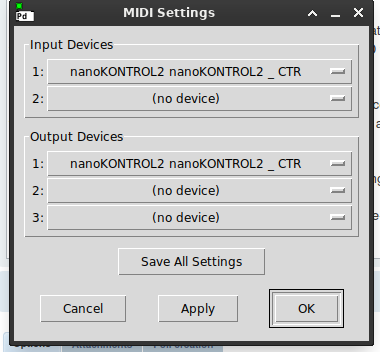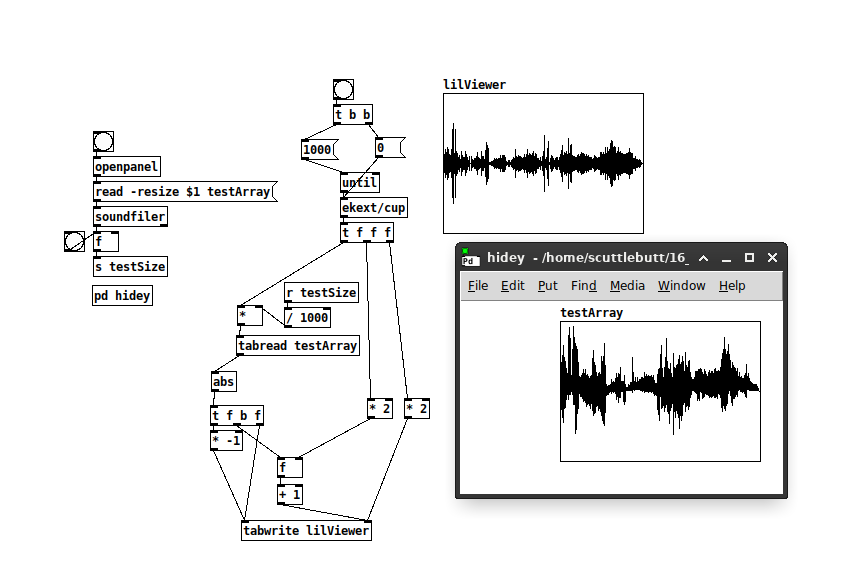-
Load074
posted in technical issues • read morethat is POSSIBLE of course... but I don't think that's what it was. This wasn't the same kind of crash as the [until] loop crash. I got many more red-font errors and TCL complaints in the main window. I still think it had to do with some sort of DSP issue, and I think the PD engine was no longer communicating with the GUI elements. It's definitely not the sort of error I'd seen until more recent versions of PD.
The errors looked a little like this person's: https://forum.pdpatchrepo.info/topic/14361/pd-error-stuck
Maybe though. Minimized SAVE dialogue is a definitely real thing.
-
Load074
posted in technical issues • read moreGood news, everyone! Even though my PD windows weren't updating at all (showing me the warning, unsaved! asterisk *), my Ctl-S saving actually DID save. Aren't you happy for me?
-
Load074
posted in technical issues • read moreArgh. And it actually wasn't that (though I've certainly done that plenty of times). It had to do with maybe trying to writesf~ with a random duration that was, I dunno, 0 ms. I cleared the console in my efforts, but there was some complaint about my audio file...
Thanks for the speedy answer, even if it's not what I wanted to hear!
-
Load074
posted in technical issues • read moreI know, save early, save often... but usually, nothing crashes anymore!
PD "server"(?) is still running, MIDI and audio work, and the windows I was working on are open, but I can't do anything (including "save") with the windows. I can drag them around, because that's my desktop manager not PD, and drop-down menus do drop down, but I can't close windows and - again - I can't save.
Any ideas before I lose my afternoon's work? I could screenshot, but most of the good stuff is in sub-patches.
I'm on Arch Linux, using XFCE4 desktop environment. The chance of someone responding before I reboot is very slim indeed.
-
Load074
posted in technical issues • read more@fishcrystals yeah, that's what I ended up doing as well. Mind you... AFTER learning the hard way on "stage" (ok, I don't usually get a literal stage to play on).
I'm still not sure why different PDs over the years have given me different options for MIDI connections (it's partially a Linux issue as well), but now I've been using the software Jack ports, then making the connections to the hardware in Jack, and everything has been predictable and reliable.
-
Load074
posted in technical issues • read moreOK... one crash-during-performance later, I'm looking more closely into this.
If I have the USB device set to "Output Device" as well as "Input Device," and unplug it while PD is running, PD will crash. If, however, the device is only "Input Device" and not an "Output Device," unplugging it is no problem.
Also, if I have PD set to "MIDI Through-Port [0,1,2,3...]" (instead of looking directly to the device) and make the nanoKONTROL2 -> MIDI Through-Port in, ie, qjackctl, then I can unplug without a crash.
So! Maybe I should file a bug report? Or maybe someone else who has an input + output USB MIDI device and is running PD on Linux (or, who knows? any platform?) wants to try this out and see if it's just me?
-
Load074
posted in technical issues • read moreHear, hear. I've been getting into the habit of (trying to) ALWAYS use [t whatever whatever], even when it seem unimportant. Too many times have I been bitten by a seemingly-innocent execution order (egad that sounds sinister) from the earliest experimental stages of whatever patch I've been building.
-
Load074
posted in technical issues • read more@oid thanks for checking your system. It's probably an Arch-thing or, more likely, a me-thing then.
I haven't changed anything about my setup, and I've used this Arch & PD installation for at least two years now. I use Jack for audio and MIDI, and usually use PD itself to make the connections (although to be honest - and this is a question I've had for ages now - I'm confused about PD MIDI connections / ALSA MIDI / Jack MIDI, and how sometimes I can make all choices in PD, and sometimes (depending on the PD version?) I have to use Jack).

-
Load074
posted in technical issues • read moreThis is new, I believe. At least, I've never encountered it before, and I'm sure I've hot-swapped in the past.
So: in PD 0.54.1, if I unplug the USB MIDI device (ie, tested both Korg nanoKontrol2 and nanoPad2), PD just up and quits. I don't need to be monitoring anything (like with [ctlin]) though the device needs to be one of my input/output devices.
I'm running up-to-date Arch Linux, kernel 6.7.1. Anyone else? Just me? Bug report, or is there a bug in my brain?
-
Load074
posted in technical issues • read more@beep-beep Hot dog - your comment actually pointed me towards something that works good enough for me!
Using [abs] will at least keep everything positive, so the discontinuities aren't crossing the zero line... and then, to make it even prettier, I inverted it with [* -1] to make a mirror image.
Since this is just for looks, I think it'll be good enough... it may turn out that I need a smaller viewer (less than 2000 points) even still, but so far, no glitches, and it looks reasonably like the 7-minute file I loaded.
 /home/scuttlebutt/Pictures/Screenshot_2024-01-23_21-42-53.png
/home/scuttlebutt/Pictures/Screenshot_2024-01-23_21-42-53.png
